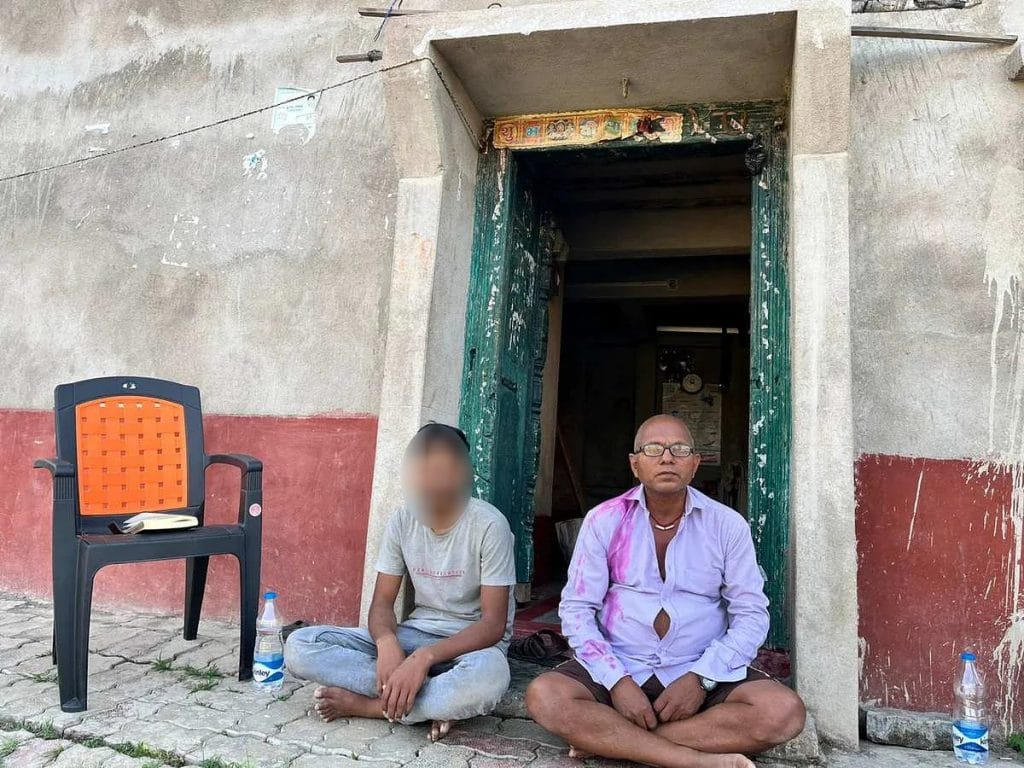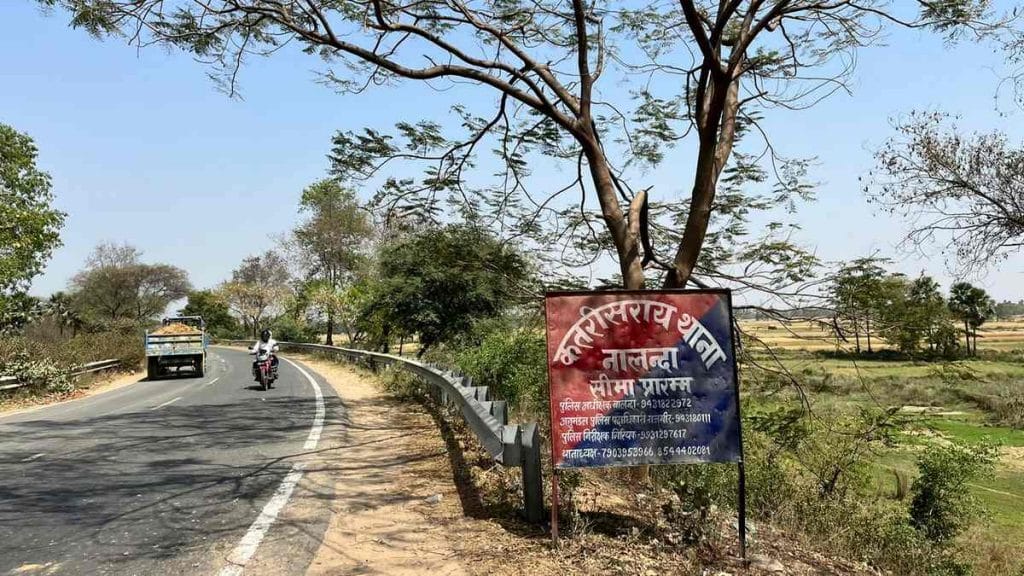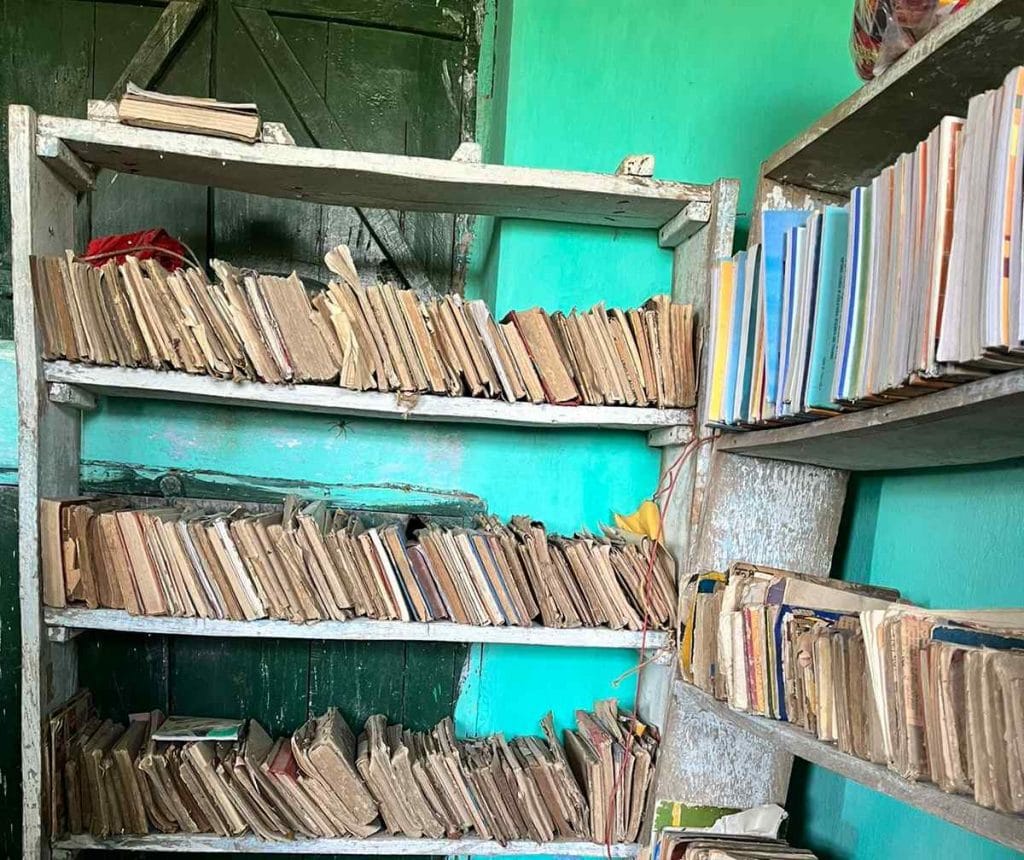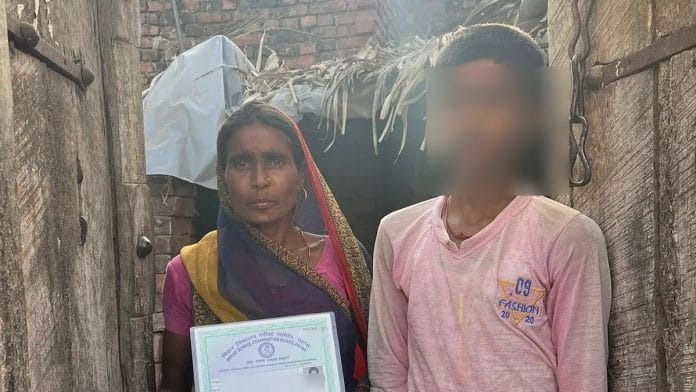Nawada: The two goats bleating in the tiny yard were assets, but a new mobile phone for her son was an investment in the future. “Padhai karbu mummy,” he’d told her— I’ll use it to study.
On a chilly January day, Sarvila Devi, a widow from Thalpos village in Nawada district, Bihar, sold off her precious goats for Rs 6,000, and handed the money to her bright and promising son, 19-year-old Gulshan.
Just a month later, he was in handcuffs.
Gulshan had used his sleek new Samsung smartphone not to take online lessons, but to con strangers out of their money. It was little consolation for 42-year-old Sarvila Devi that she did not have to suffer this ignominy alone.
On 15 February, Nawada Police conducted a raid and arrested 33 men, ranging in age from 14 to 40, for committing cyber-fraud. Of these, no less than 31 were residents of nondescript little Thalpos.
Now, it seems as if almost every other family in the village is running pillar to post to secure bail, faces grim and eyes downcast.
More than anything, they are confused, disbelieving: Their sons, tech-savvy and pursuing an education, were supposed to become success stories — not cautionary tales for wayward youth in adjoining villages.
What went wrong here?
In the fifth dispatch of ThePrint’s ‘Generation Nowhere’ series, we look at the trend of youngsters from poor families in Bihar’s hinterlands being drawn into the world of cybercrime, with smartphones as their main weapon.
Also Read: Red-eyed, lost young men in Bihar’s Seemanchal show how Nitish Kumar’s alcohol ban backfired
Unlikely ‘crime scenes’ — tube wells, fields, under trees
Most residents of pastoral Thalpos, home to only a few thousand residents, thought nothing of the youngsters hanging out in the fields in small groups. But at least one person felt that something wasn’t right.
This informant went to Baidnath Prasad, the 57-year-old sub-inspector posted at Thalpos thana. “I learnt that more than 50 people here would gather around tube wells or sit in the fields to carry on with whatever they were doing,” Prasad said.
His ears immediately perked up — if something looked suspicious, it probably was. “The police from outside keep coming here,” he said.

Petty crime, conducted largely through smartphones of late, is something of a cottage industry in this belt of South Bihar, broadly comprising Nawada, Nalanda, Gaya Jamui, and Sheikhpura districts. Earlier this year, in fact, the Economic Offences Unit of the Bihar Police gave these districts the dubious distinction of being the cybercrime hotspots of the state.
It was perhaps only a matter of time before Thalpos got sucked in too.
One of five villages under Konandpur Panchayat in Pakribarawan block in Nawada, Thalpos shares its taadi-tree-lined west border with Warisaliganj block, infamous for frauds and cybercrimes. Just last December, the police had arrested 17 cyber-criminals, including the headman, from a village here. Also within a roughly 20-kilometre radius is Nalanda’s Katrisarai, which is notorious as an epicentre of fraud, ranging from fake medicines to cyber scams.
Now, it seemed as if a new hub of crime was taking shape. Prasad relayed the information about furtive youth lurking in Thalpos to senior police officials, who moved into action within a week.
“Teams were formed and sent to hotspots around 1 in the afternoon. During the raid, some tried to attack the police and some managed to flee, but we were able to arrest 33 people,” investigating officer (IO) Sanjeev Kumar said.
It turned out to be one of the biggest and most fruitful raids that Nawada Police had ever conducted.
The police seized bikes, laptops, dossiers, letterheads, stamps, and SIM cards and arrested the suspects under multiple provisions of the Indian Penal Code — including sections 420 (cheating), 419 (impersonation), 120B (criminal conspiracy), 467 and 468 (forgery), and 353 (assault to deter a public servant from discharging their duty).
The police also invoked provisions of the IT Act, including sections 66 B (dishonestly receiving stolen computer resources or communication devices), C (identity theft), and D (personation using a computer resource).
Out of the 33 people nabbed, 31 were from Thalpos. The FIR, which ThePrint has accessed, indicates that most of the arrested are between 19 to 25 years old, but there are also minors as young as 14, 15, and 16.

Some of the suspects are currently out on bail, but others—including Gulshan—are still lodged in Sherghati jail in Nalanda. The police are yet to file a chargesheet.
While the fact that so many people were arrested from one small village sets this case apart, Nawada district has witnessed a general uptick in cybercrime. In 2019-20, Nawada Police arrested 28 people for cybercrimes in 18 cases, followed by 30 in 14 cases in 2020-21. But in 2022, until just March, the police here arrested 38 people in 11 cases.
“Ninety per cent of Konandpur Panchayat [under which Thalpos falls] is getting into this kind of fraud,” IO Kumar said, adding that the targets/victims in such cases were generally from other states.
“Police from different parts of the country reach out to us with phone numbers to trace… because numbers from here are used to commit fraud in other states,” he said. “Most of them belong to normal families but they get attracted to the idea of less hard work and more easy money.”

The newly elected mukhiya (headman) of Konandpur Panchayat, 30-year-old Sanjeet Kumar, agrees with this assessment but says that it’s an old problem in a new bottle.
“This has been going for a decade now. Earlier they used to thug people in the name of Ayurvedic medicines,” Kumar said, in a reference to a popular scam that involved selling fake pills and tonics to ‘boost sex power’ and suchlike.
Things are changing, though, Kumar said: “With the new generation and new technology, crime has also taken a new shape.”
Also Read: #GenerationNowhere: India’s young are fighting an invisible epidemic, smartphone addiction
The modus operandi
By all accounts, the alleged gang’s portfolio of scams was not very sophisticated, but neither were many of their targets, leading to some ‘success’.
According to police documents, the accused villagers had gotten hold of the mobile numbers, bank account details, and IFSC codes of many people, and used this information to gain trust and ask for OTPs. Some, for instance, would call the target and promise approval letters for dealerships and the like in return for a “fee” for processing, licensing, or registration.
“Koi high-tech group nahin hain (This is no high-tech group),” IO Kumar said. “Their basic strategy was to simply call on the numbers and tell the person that their work would be done if they sent a certain amount of money.”
Some of the accused kept their scams extremely basic. Gulshan Kumar, the police said, used his Samsung phone and a six-page datasheet of mobile numbers to try and con people into paying up for mobile tower installation (which, of course, would never materialise).
Another accused, 19-year-old Nitish Kumar Yadav was caught with a Gfive mobile and a 40-page datasheet. Saurabh Kumar, who is only 14, was found with a printed data sheet and a Samsung mobile.

Others were a little more ‘evolved’ in their alleged fraudulent endeavours.
For example, 25-year-old Ashutosh Kumar was caught with a laptop, official letterheads, central government stamps, and the personal details of many people. He had folders on his laptop that suggested that he was demanding Rs 75,000 from a target in return for an approval letter from the Gas Authority of India Limited (GAIL). He also possessed a receipt of Rs 1.25 lakh in the name of a CNG dealership.
The police believe he was working to demand Rs 5.90 lakh in return for a no-objection certificate (NoC) from Hindustan Petroleum Corporation Limited (HPCL). The police also recovered a Bharat Gas dealer certificate, an Ather Energy dealership application form, and an Indane registration fee form from him.
Another accused, 22-year-old Kundan Kumar, had approval letters for OLA Electric Mobility Pvt Limited and an online gas agency dealership. He was demanding Rs 35,000-45,000 as “processing fees” from different persons. He also had a targeted list of persons for Mudra Loans.
However, the investigating officer believes that this raid has only scratched the surface and that the “masterminds” of the gang are still operating from different locations.
“They will target new villages and lure the more young into this business,” he said.
Out-of-work-migrants, schoolboys drawn to crime post-Covid
According to some residents of the village, who did not wish to be named out of fear of reprisal, the entire network in Thalpos flowed from one Sachin Kumar from Katrisarai in Nalanda, who is infamous in the area for cybercrimes and has allegedly also served time in jail.
His associates, Thalpos residents alleged, befriended some young men in the village — including, Ashutosh, Vikki, Kundan, Nikhil, and Vivekanand — and influenced them to take up petty cybercrime. Soon, others were drawn into the net, particularly boys from poor families and migrants who had returned home due to Covid and were desperate for money.

“This is an average village… most of the population is dependent on agriculture and the young migrate to other parts of the country,” Ramji Shamra, an elderly resident, said.
With Covid hitting in 2020, many migrants lost their jobs and had to return home. Students, too, were no longer gainfully engaged at school, but did have mobile phones to facilitate online classes.
“Mobiles have become a crucial part of everyone’s life after Covid hit the nation. Schools were closed and at home, children did not have much to do. Boys from poor families are into this by dekha-dekhi (copying other),” Pramod Kumar Jha, an education officer who is posted in the Pakribarawan block, said.
New phones and rapid downfalls
Everyone in Thalpos village remembers 19-year-old Gulshan Kumar as a sincere boy who wanted to break free from acute poverty and bring fortunes into his widowed mother’s kutcha house. “He promised us a better future,” Sarvila Devi said.
In 2019, Gulshan secured a first division in his class 10 exams and won a Rs 10,000 scholarship under the Mukhyamantri Balak Balika Protsahan Yojana, a state scheme for students. He also tried to bolster the income of the family — comprising his mother and his younger brother Shubham — by taking tuitions.

“He used to charge Rs 60 per child and made around Rs 3,000 every month,” Sarvila Devi said with pride, adding that the family also got income from her widow pension (Rs 400) and some land they cultivated on lease. This was just about enough to eke out a living.
However, Gulshan started wavering from his path soon after he bought his first Android phone with part of the scholarship money. He failed his class 12 exams in 2021 and promised his mother he would study and do well if she got him a better mobile phone. Even today, his mother Sarvila Devi believes that Gulshan was just using his phone to study and was wrongly accused.
With him now in jail, she is doing her best to make ends meet alone, but the burdens are immense: She has twice taken loans of Rs 40,000 to buy cows and now is also trying to secure bail for Gulshan.
Bhushan Mistry is another resident of the village who was scarred by the February raid. Both his sons — Rohit, 19, and Saurabh, 14 — were arrested. Saurabh has been granted bail, but Rohit is still in Sherghati jail.
“Rohit had asked for an android phone and it was gifted by one of his elder brothers,” Mistry said.

Another accused, Rahul Kumar, 16, bought a Vivo mobile just days prior to his arrest. He was to appear for his 10th board exams but could not sit for it as he was sent to a juvenile home.
His father Bhushan Thakur, 63, who works as a barber, had high hopes for his younger son. “All my sons work as carpenters but Rahul was good in studies.”
ThePrint visited other homes where young sons had been arrested but had been released on bail. Most insisted that the police had wrongly implicated their boys who had just happened to be at the wrong place at the wrong time and maybe in the wrong company when the 15 February raid took place.
A fairly common, and predictable, refrain at the village when ThePrint visited is that “outsiders” lured the boys into the promise of easy money. What no one says is that these disembodied “outsiders”, lurking at the other end of a smartphone somewhere, offered a more lucrative occupation than anything else available in the vicinity.
Many residents feel a deep sense of shame at the arrests, with some harking back to the past to emphasise that they haven’t always been associated with disrepute.
“We have had one DSP from the village. The first chief minister of Bihar, Shri Krishna Sinha had visited our library and written ‘prasannata hui (I am pleased)’ in the diary,” village elder Ramji Shamra recalled.
As it happens, libraries are also what the district administration is looking at to create alternatives for the future of the youths here.

Books, not just internet connection
The internet and technology have been lifelines to many school and college students in the wake of Covid, but as Dhurat Sayli Savlaram, Superintendent of Police, Nawada, pointed out, there are “two sides” to it.
“Cybercrime is the other side. Most of the arrested people in the recent raids are younger people,” she said.
Taking a cue from Purnea district, which in 2020 started a successful library drive to give direction and focus to youth, Nawada too is looking to books to help bring about a change.
“We started a library initiative in the panchayats last year so that we can place books in the hands of young people and they can utilise their energy,” Yashpal Meena, District Magistrate of Nawada, said.
So far, he said, the response has been encouraging. “We are providing books to the young who are distracted by so many reasons and turn towards crimes,” Meena said.
In addition to this, the administration is focusing on schemes being implemented through the District Registration cum Counselling Centre (DRCC), Meena said.
Under this scheme, the Bihar government provides students with a credit card for higher education (up to Rs 4 lakh credit/loan), as well as a self-help allowance of Rs 1,000 per month for two years for those who are preparing for competitive exams. Also, a part of this is a 90-day programme called Kushal Yuva, which provides 90 days’ worth of training in computer, communication skills, and English.
It is hoped, Meena added, that schemes like this will prevent at least some bright young people from going astray. “One of our inmates have who is an undertrial had managed to clear the joint Admission Test for IIT [from prison] and secured 54th rank nationally,” Meena said.
(Edited by Asavari Singh)






